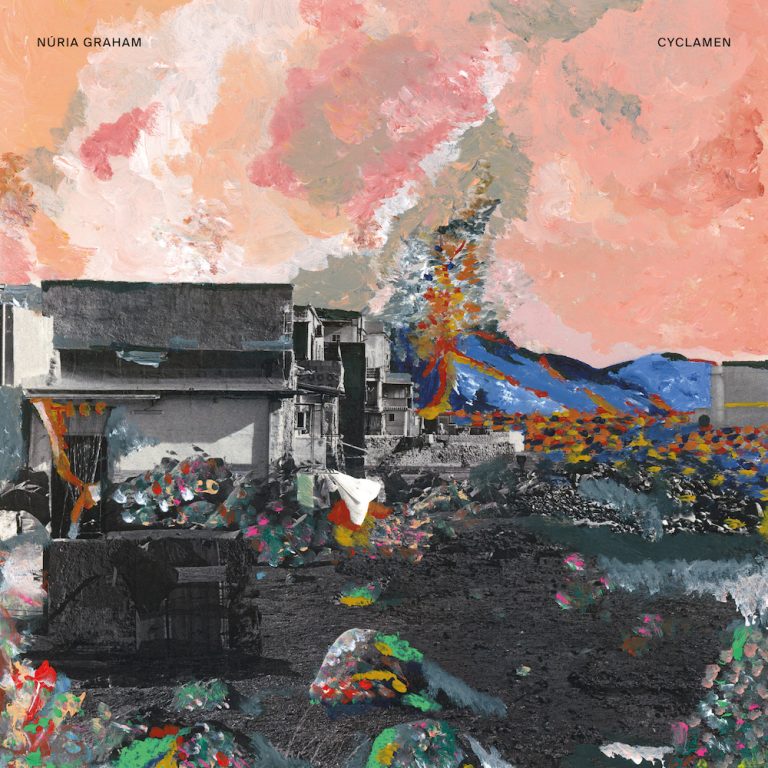Núria Graham is Irish-Catalan. That is an interesting mix upon which to construct an identity. Both cultures are notably colorful, festive, cheerful, and underappreciated in their beauty, yet also marked historically by strength, resilience, and the desire to stand on their own. Whether intentionally or not, Graham brings a similar balance to her work, with Cyclamen being an enrapturing blend of instrumental levity and a lyrically grounded nature that is bound to keep the listener engaged throughout.
Grounded lightness can appear rather literally, with the opener “Procida I” describing the singer retreating to this rather unknown beach off the coast of Naples that invites the listener to join her with its spacious, dreamy sound. This invitation is followed by the intimate single “The Catalyst”, where alongside her piano she navigates how she feels about her place in a relationship in her “stupid Catalan English”, her melodic musings firmly supported by the double bass that will go on to keep this entire record down to earth. She follows this up with the lead single “Yes It’s Me, The Goldfish!”, a balancing act of frustrations and detachments as over the low-tempo rhythm of the drums she questions “Would it make a difference if I was completely gone?” while in the same breath singing “I am very pleased just being this fish in a bowl”, her aquarium a metaphor for the constraining mundaneness of life. It is a stunning display of self-contained emotional intensity that makes even the most dream-like melody feel tinged with reality.
“Poisonous Sunflower” keeps true to its titular contrast with its strings that evoke flowery fields with its tense lyrics as the singer pleads for the “power to not speak”. After “Birdman”, whose verses’ cadence is eerily reminiscent of “Blackbird”, the record suddenly gives the acoustic the leading role for “Fire Mountain, oh Sacred Ancient Fountain”. It’s a reflective piece, with a religious thematic blending with the warm yet cutting instrumental that recalls a ray of sunlight piercing through forest leaves. This atmosphere is undone by the quiet and heavy sounds of “Oh I Bless Thee”, which transports you to a new scene for “Disaster in Napoli”. It is one of the record’s most interesting moments, with the returning double bass, the resounding drums, and the electric guitar backdrop all being precise yet never loud, creating an atmosphere of tension that borders on stress and yet retains an inviting charm in its storytelling. If tension and stories of lover’s quarrels with ambiguous endings are not your cups of tea however, “The Beginnings of Things” might be a better suit. It just might be the record’s softest, sweetest moment, with its minimal sound and lyrics of vulnerable reassurance that infallibly put the listener at ease.
For all the beauty of her polished and dreamy compositions, however, Graham is most distinctively skilled in making a loose stream-of-consciousness work compelling. The casual feel of “Gloria” makes the listener feel as though they’re facing the singer with how conversational she is. “Dust Bowl Dreaming”, with its simplistic instrument, captures one single lovestruck moment in a way that’s hard not to smile at. “The Waterway” perfectly marries its theme of confusion with its free-flowing vocal melody. Finally, closing it all off, “Procida II” makes the intro more natural and spacious, an ethereal and ambiguous ending appropriate for such a dream-like album.
Núria Graham hardly embellishes herself. Even with her oddest fables, we can always see the artist behind the art. Her work is pure naturality with all its contrasts and quirks, but also all of its beauty and intimacy. Her melodies, even at her most unusual, are inviting and engaging, making for a body of work with a disproportionally low entry barrier for how much it rewards attentive listening. Once you have done that though, these are great songs on their own beyond deep analysis. In a world that has very clearly forgotten how to make music for a sushi restaurant, it’s nice to see we still get top-quality music for a coffee shop. After all, what is better than music that hides a world when you have the time to listen closely, but delivers a warm hug if you’re just passing by?

